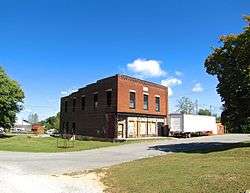Doyle, Tennessee
Doyle is a town in White County, Tennessee, United States. The population was 537 at the 2010 census.
Doyle, Tennessee | |
|---|---|
 The W.S. Terry building in Doyle | |
 Location of Doyle in White County, Tennessee. | |
| Coordinates: 35°51′13″N 85°30′47″W | |
| Country | United States |
| State | Tennessee |
| County | White |
| Incorporated | 1905[1] |
| Named for | Doyle family (early settlers)[2] |
| Area | |
| • Total | 1.24 sq mi (3.20 km2) |
| • Land | 1.24 sq mi (3.20 km2) |
| • Water | 0.00 sq mi (0.00 km2) |
| Elevation | 938 ft (286 m) |
| Population | |
| • Total | 537 |
| • Estimate (2019)[5] | 577 |
| • Density | 466.83/sq mi (180.27/km2) |
| Time zone | UTC-6 (Central (CST)) |
| • Summer (DST) | UTC-5 (CDT) |
| ZIP code | 38559 |
| Area code(s) | 931 |
| FIPS code | 47-21500[6] |
| GNIS feature ID | 1282764[7] |
History
Doyle, originally known as Doyle Station, developed as a railroad stop in the early 1880s. By 1884, Doyle College had been established, and would operate in the town for more than four decades.[8] Goodspeed's History of White County, Tennessee, published in the late 1880s, indicated the town had about 150 residents.[9] The town incorporated in 1905.[1]
Geography
Doyle is located at 35°51′13″N 85°30′47″W (35.853664, -85.512981).[10] The town is situated along the Highland Rim at the eastern base of a ridge known as Gum Spring Mountain. The Calfkiller River empties into the Caney Fork just southeast of Doyle.
U.S. Route 70S, which connects Doyle with Sparta to the northeast and McMinnville to the southwest, and State Route 285, which connects Doyle with the Spencer and Fall Creek Falls areas to the southeast, intersect just inside Doyle's southeastern city limits. State Route 111 passes just east of Doyle.
According to the United States Census Bureau, the town has a total area of 1.3 square miles (3.4 km2), all of it land.
Demographics
| Historical population | |||
|---|---|---|---|
| Census | Pop. | %± | |
| 1970 | 446 | — | |
| 1980 | 344 | −22.9% | |
| 1990 | 345 | 0.3% | |
| 2000 | 525 | 52.2% | |
| 2010 | 537 | 2.3% | |
| Est. 2019 | 577 | [5] | 7.4% |
| Sources:[11][12] | |||
As of the census[6] of 2000, there were 525 people, 224 households, and 155 families residing in the town. The population density was 410.6 people per square mile (158.4/km2). There were 252 housing units at an average density of 197.1 per square mile (76.0/km2). The racial makeup of the town was 98.29% White, 0.19% African American, 0.19% Native American, 0.76% from other races, and 0.57% from two or more races. Hispanic or Latino of any race were 1.33% of the population.
There were 224 households, out of which 26.3% had children under the age of 18 living with them, 51.8% were married couples living together, 9.8% had a female householder with no husband present, and 30.4% were non-families. 26.3% of all households were made up of individuals, and 12.9% had someone living alone who was 65 years of age or older. The average household size was 2.34 and the average family size was 2.80.
In the town, the population was spread out, with 21.9% under the age of 18, 7.4% from 18 to 24, 28.0% from 25 to 44, 26.1% from 45 to 64, and 16.6% who were 65 years of age or older. The median age was 40 years. For every 100 females, there were 97.4 males. For every 100 females age 18 and over, there were 86.4 males.
The median income for a household in the town was $26,364, and the median income for a family was $28,958. Males had a median income of $21,538 versus $17,188 for females. The per capita income for the town was $13,619. About 17.2% of families and 21.3% of the population were below the poverty line, including 19.9% of those under age 18 and 23.4% of those age 65 or over.
References
- Tennessee Blue Book, 2005-2006, pp. 618-625.
- Larry Miller, Tennessee Place Names (Indiana University Press, 2001), p. 61.
- "2019 U.S. Gazetteer Files". United States Census Bureau. Retrieved July 30, 2020.
- Tennessee Department of Economic and Community Development, Certified Population of Tennessee Incorporated Municipalities and Counties Archived 2014-06-30 at the Wayback Machine, State of Tennessee website, 1 July 2011.
- "Population and Housing Unit Estimates". United States Census Bureau. May 24, 2020. Retrieved May 27, 2020.
- "U.S. Census website". United States Census Bureau. Retrieved 2008-01-31.
- "US Board on Geographic Names". United States Geological Survey. 2007-10-25. Retrieved 2008-01-31.
- Jeanette Keith, Country People in the New South (University of North Carolina Press, 2000), p. 121.
- Goodspeed's History of White County, Tennessee (Goodspeed Publishing, 1886). Accessed at TNGenWeb.org 21 October 2016.
- "US Gazetteer files: 2010, 2000, and 1990". United States Census Bureau. 2011-02-12. Retrieved 2011-04-23.
- "Census of Population and Housing: Decennial Censuses". United States Census Bureau. Retrieved 2012-03-04.
- "Incorporated Places and Minor Civil Divisions Datasets: Subcounty Resident Population Estimates: April 1, 2010 to July 1, 2012". Population Estimates. U.S. Census Bureau. Archived from the original on 11 June 2013. Retrieved 11 December 2013.
External links
| Wikimedia Commons has media related to Doyle, Tennessee. |
- Municipal Technical Advisory Service entry for Town of Doyle — information on local government, elections, and link to charter
- Doyle Elementary School